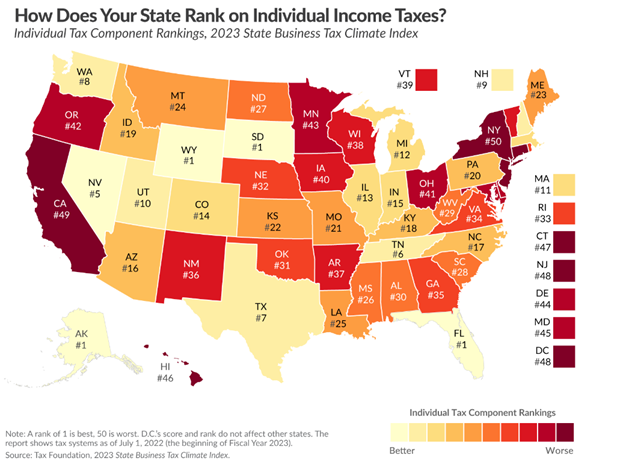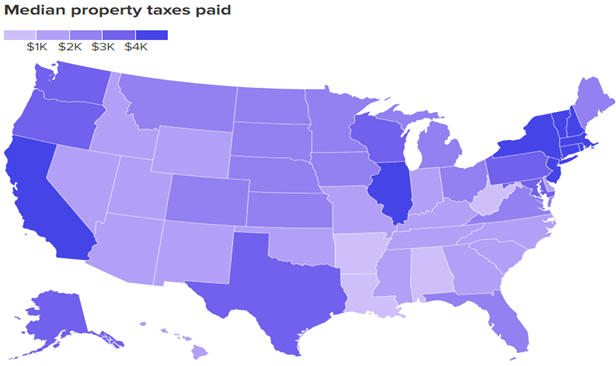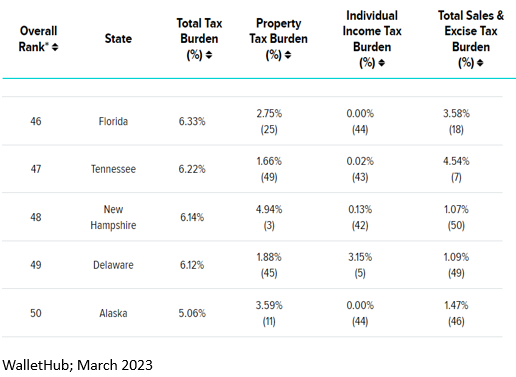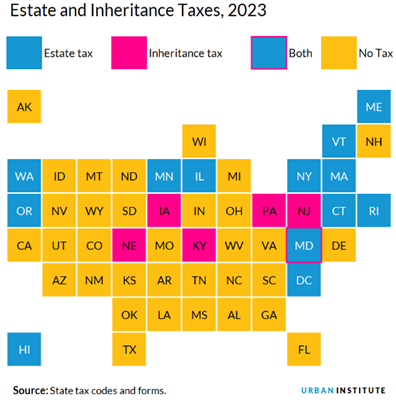Are You Considering Relocating to Another State?
/Are You Considering Relocating to Another State? Comparing Tax Rates for Retirees
As I wrote in a 2019 post, the potential impact of future taxes is often an important consideration for retirees when choosing to move to another state. Besides moving to an area with a warmer climate or closer to family and friends, the goal of minimizing expenses, including taxes, is often at the top of the priority list.
The question is often asked “Can I actually save money by moving to a different state?”, and the answer is “it depends.” It is based not only on where someone moves to, but also how they live their life.
Prior to making the decision to relocate, it is important to compare the different taxes. This might include reviewing:
Projected state and local income taxes
Property taxes
Sales taxes that would impact you
Additional considerations i.e., the level of state estate and inheritance taxes
As we will explore here, the tax rules differ from state to state, sometimes by significant amounts. Because a tax burden often comprises a significant part of the overall cost of living, understanding the major tax impacts from one state to another is important prior to making a relocation decision out-of-state.
Income Taxes
If the intent is to relocate to a lower-tax state, the first thought might be to move to a state that has no personal income tax. While understandable, if the individual is no longer working, simply moving to a state with a low income tax rate might not be a priority compared to the other forms of taxes that will come into play. For retirees, whether a state taxes different forms of retirement plan income might be of greatest importance.
Currently, the state with the highest state income tax as a percentage of income is New York, followed by California, New Jersey and Connecticut (source: Tax Foundation, 2023).
On the contrary, there are now 8 states that do not have an income tax: Alaska, Florida, Nevada, South Dakota, Tennessee, Texas, Washington and Wyoming. New Hampshire doesn’t have a state income tax, although they do tax dividend and interest income received. There are also 4 states that have a state income tax, but do not tax retirement income: Illinois, Iowa, Mississippi, and Pennsylvania.
For Illinois residents, for example, withdrawals from retirement accounts, public and private pension income, and social security payments, are all classified as non-taxable income. This feature, along with the fact that Illinois currently assesses a flat income tax rate at a comparatively low 4.95%, helps to place Illinois as #13 among all states in its level of state income tax.
Importantly, many states have made significant changes to their state income tax laws over the past few years and the expectation is that more changes are coming. Driving these changes has been the surge in revenue that states received during the pandemic recovery in 2021. How states were able to manage the influx of funds and subsequently position their finances for the future is impacting future tax policy.
Iowa is a prime example of this where their legislature voted to cut the top state income tax rate to 6% from 8.53% in 2022. It plans on dropping to a flat 3.9% income tax rate for all residents by 2026 with a goal of a 0% state income tax by 2027 (WSJ, October 3, 2023).
The following map ranks the states by their level of income taxes at the beginning of fiscal 2023. A state with a lower number represents a lower income tax burden and visa-versa (for example, the 8 states with no state income tax will be ranked 1-8 in the illustration).
Property Taxes
Similar to state income taxes, the amount Americans pay in annual property taxes can vary by thousands of dollars depending on where someone resides.
For example, in New Jersey, residents pay a median of $8,797, the highest of all U.S. states (CNBC, 2023), followed by Illinois, New Hampshire, Connecticut and Vermont. Overall, the Northeast and Midwest dominate the list of states with the highest property tax rates.
On the opposite end of the spectrum, the lowest median property tax bill is in Alabama, at only $646 annually followed by West Virginia, Arkansas, Louisiana and South Carolina (Source: Tax Foundation, 2023).
Please note that even in states with low median property taxes (shaded in light purple above), it is possible within these states to have relatively high local property taxes.
Also, prior to the 2017 Tax Cuts and Jobs Act (TCJA), living in a state with high property taxes had the potential to be less burdensome from an overall tax standpoint because of the full deductibility of the property tax dollars against income when filing the Federal Income Tax return. The TCJA capped allowable state and local tax deductions, including property tax, at $10,000 (for individuals and married couples, filing jointly).
As a result, people who live in states with higher property taxes were often unable to deduct all of their state taxes paid, including property taxes, on their federal return due to the $10,000 deduction cap. Because of that, many residents have unfortunately had to pay more in federal income taxes than in the past when there was an unlimited income tax deduction for the amount of property taxes paid.
Sales Taxes: State and Local
Currently, there are 45 states that collect statewide sales taxes and 38 states that collect local sales taxes. There are currently five states that forego statewide sales taxes: Alaska, Delaware, Montana, New Hampshire and Oregon. Of these, only Alaska allows localities the power to impose local sales taxes.
The five states with the highest average combined state and local sales tax rates are Tennessee (9.548%), Louisiana (9.547%), Arkansas (9.44%), Washington (9.40%), and Alabama (9.24%).
It is interesting that Tennessee, the state with the highest average sales taxes in the United States, is also one of the lowest property tax states and among the few states that assesses no income taxes. Other states with low comparative taxes in one category may implement other high taxes on necessities such as gasoline or charging more for state services such as driver’s licenses or car registrations. For residents, those hidden costs can have a real impact on the personal budget.
This illustrates that state governments will generate tax revenue in various ways to cover its expenses, and it is important to know the potential impact of a state’s tax structure on you.
Finally, similar to recent changes that certain states have made to their income tax laws, it is interesting to know that many states have also made adjustments to their sales tax rates in the past few years. South Dakota, for example, recently trimmed its state sales tax from 4.5% to 4.2% while New Mexico reduced the rate from 5.125% to 5% in July of 2022.
Combined Overall Taxes: Highest and Lowest States
When viewing the level of taxes in aggregate (property, income and sales and excise taxes) as a percentage of personal income, New York currently has the highest overall tax burden on its residents, while Alaska ranks as the state with the lowest taxes (Source: WalletHub; March 2023).
Here is a truncated version of the states with the highest and lowest taxes.
Death and Inheritance Taxes
Besides the impact from state income, property and sales taxes, often overlooked when relocating from one state to another from a tax impact standpoint are death and inheritance taxes. For those concerned with how their beneficiaries will be impacted in the future, comparing estate or inheritance tax rules in your current and future home states is important prior to moving.
Most states don’t impose death taxes, but in those that do, state taxes may kick in well before federal estate taxes. Currently, there are 32 states that do not levy a state estate or inheritance tax (see the yellow boxes in the chart below).
In some instances, the level of state estate taxes could be a determining factor in whether an individual decides on relocating to one state compared to another.
For example, if one is considering relocating to a state with no income taxes, such as Washington State or Florida, it might be interesting to know that Washington has one of the highest estate tax rates (20%) above an exemption amount of $2.193 million. Washington is also ranked as the 4th highest taxed state from a sales and excise tax standpoint. Florida, on the other hand, doesn’t have a state death tax and its level of state and excise tax is considerably lower, ranked at 24th.
Summary
There are many areas that people nearing retirement need to explore and educate themselves on prior to making the decision to relocate to another state. For just about everybody, affordability and the cost of living is a major determinant on where to live during the retirement years. Included in that calculation is the impact one can expect from future taxes, and the fact that the taxes which seniors are subject to during retirement can vary greatly depending on where they live.
The Advanced Planning and Advisory teams at Clearwater Capital Partners provide guidance and comprehensive planning as part of the relocation decision process in coordination with one’s personal tax advisor.
Note: Nothing contained herein is offered as tax advice. Please consult qualified professionals with any tax planning needs or tax questions that you may have.








